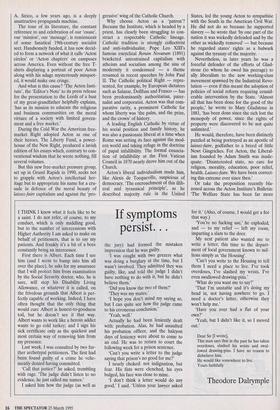If symptoms persist. .
I THINK I know what it feels like to be a saint. I do not refer, of course, to my conduct, which is only middling good, but to the number of intercessions with Higher Authority I am asked to make on behalf of petitioners, that is to say my patients. And frankly it's a bit of a bore constantly being an intercessor.
First there is Albert. Each time I see him (and I seem to bump into him all over the place), he asks for my assurance that I will protect him from examination by the Social Security doctor, who, he is sure, will stop his Disability Living Allowance, or whatever it is called, on the frivolous grounds that Albert is per- fectly capable of working. Indeed, I have often thought that the only thing that would cure Albert is honest-to-goodness toil, but he doesn't see it that way. Albert wants to work like a heroin addict wants to go cold turkey; and I sign his sick certificate only as the quickest and most certain way of removing him from my presence.
Last week, I was consulted by two fur- ther archetypal petitioners. The first had been found guilty of a crime he vehe- mently denied having committed.
`Call that justice?' he asked, trembling with rage. 'The judge didn't listen to no evidence, he just called me names.'
I asked him how the judge (as well as the jury) had formed the mistaken impression that he was guilty.
`I was caught with two geezers what was doing a burglary at the time, but I wasn't involved. They admitted they was guilty, like, and told the judge I didn't have nothing to do with it, but he didn't believe them.'
`Did you know the two of them?'
`They was my mates.' `I hope you don't mind my saying so, but I can quite see how the judge came to his erroneous conclusion.'
`Yeah, well.'
Actually he had been leniently dealt with: probation. Alas, he had assaulted his probation officer, and the halcyon days of leniency were about to come to an end. He was to return to court the following week for a prison sentence.
`Can't you write a letter to the judge saying that prison's no good for me?'
I nearly choked: not indignation, but fear. His fists were clenched, his eyes bulged, his face was close to mine.
`I don't think a letter would do any good,' I said. 'Unless your lawyer asked for it.' (Also, of course, I would get a fee that way.) `You're no flicking use,' he exploded, and — to my relief — left my room, imparting a slam to the door.
My next patient also wanted me to write a letter, this time to the depart- ment of local government known to mil- lions simply as 'the Housing'.
`Can't you write to the Housing to tell them I need a place to live. I've took overdoses, I've slashed my wrists, I've even swallowed drawing-pins.'
`What do you want me to say?'
`That I'm unstable and it's doing my head in, not having nowhere to go. need a doctor's letter, otherwise they won't help me.'
`Have you ever had a flat of your own?'
`Yeah, but I didn't like it, so I moved out.'
Dear Sir [I wrote], This man says that in the past he has taken overdoses, slashed his wrists and swal- lowed drawing-pins. I have no reason to disbelieve him.
He would like somewhere to live.
Yours faithfully
Theodore Dalrymple


























































 Previous page
Previous page